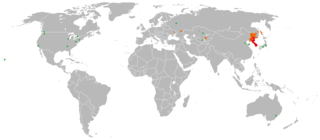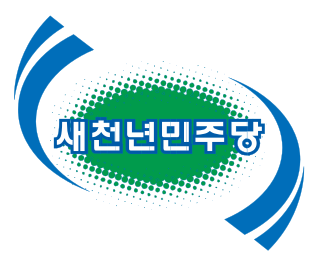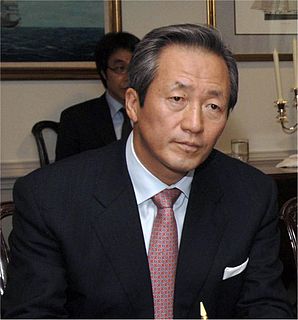Nosamo (Korean : 노사모; acronym for 노무현을 사랑하는 사람들의 모임 "gathering of people who love Roh Moo-hyun") is an internet-based group organised in 2000 as a fan club for the South Korean politician and former president Roh Moo-hyun.

The Korean language is an East Asian language spoken by about 77 million people. It is a member of the Koreanic language family and is the official and national language of both Koreas: North Korea and South Korea, with different standardized official forms used in each country. It is also one of the two official languages in the Yanbian Korean Autonomous Prefecture and Changbai Korean Autonomous County of Jilin province, China. It is also spoken in parts of Sakhalin, Ukraine and Central Asia.

Roh Moo-hyunGOM was a South Korean politician who served as President of South Korea (2003–2008). Roh's pre-presidential political career was focused on human rights advocacy for student activists in South Korea. His electoral career later expanded to a focus on overcoming regionalism in South Korean politics, culminating in his election to the presidency. He achieved a large following among younger internet users, particularly at the website OhMyNews, which aided his success in the presidential election.

The Internet is the global system of interconnected computer networks that use the Internet protocol suite (TCP/IP) to link devices worldwide. It is a network of networks that consists of private, public, academic, business, and government networks of local to global scope, linked by a broad array of electronic, wireless, and optical networking technologies. The Internet carries a vast range of information resources and services, such as the inter-linked hypertext documents and applications of the World Wide Web (WWW), electronic mail, telephony, and file sharing. Some publications no longer capitalize "internet".
Nosamo started small (at a PC bang - internet cafes of South Korea - in Daejeon by a few netizens), but soon counted celebrities and prominent political figures among its growing number of members. In 2002, the group came into national prominence as an active force behind Roh's election to the presidency in a tight, bitterly fought contest that pitted Roh against the more established political figure of Lee Hoi-chang (see South Korean Presidential Election, 2002).

A PC bang is a type of LAN gaming center in South Korea, where patrons can play multiplayer computer games for an hourly fee. The typical cost for an hour of play ranges from 500 to 1500 KRW, with 1000 KRW per hour being the most common rate. Although the per capita penetration of personal computers and broadband internet access in South Korea is one of the highest in the world, PC bangs remain popular as they provide a social meeting place for gamers to play together with their peers. Aside from the social aspect, PC bangs' ability to offer access to expensive and powerful high-end personal computers, designed specifically for video gaming, at a comparatively low price has also bolstered their popularity.

South Korea, officially the Republic of Korea (ROK), is a country in East Asia, constituting the southern part of the Korean Peninsula. The name Korea is derived from Goguryeo which was one of the great powers in East Asia during its time, ruling most of the Korean Peninsula, Manchuria, parts of the Russian Far East and Inner Mongolia under Gwanggaeto the Great. Its capital, Seoul, is a major global city and half of South Korea's 51 million people live in the Seoul Capital Area, the fourth largest metropolitan economy in the world.

Daejeon is South Korea's fifth-largest metropolis. Daejeon had a population of over 1.5 million in 2010. Located in the central region of South Korea, Daejeon serves as a hub of transportation and is at the crossroads of major transport routes. The capital Seoul is about 50 minutes away by KTX high-speed train.
Lee, seen as the more conservative candidate, drew more support among the older generation, while most of Roh's support came from the younger generation. Nosamo is widely credited with mobilising the younger voters in the election; its efforts included a mobile-phone campaign on election day to urge young voters to cast their ballots.
After Roh's victory in the election, Nosamo remained an important source of political support for the president, particularly in 2004 when the South Korean parliament voted to impeach him for illegal electioneering and incompetence; Nosamo members organised a candlelight vigil in protest.
Because Nosamo as an internet-based political organisation has very little precedent in Korea or elsewhere, it has attracted a fair amount of criticism. Some have questioned whether some of Nosamo's campaign strategies broke election laws, and the selection of prominent Nosamo members as Roh's close aides has invited charges of favouritism. Later, some of these aides were involved in corruption scandals. As of 2005, Nosamo had lost some of its political momentum as Roh's presidency saw a dip in popularity among his core supporters due to his labour policies and the deployment of troops to Iraq.

Iraq, officially the Republic of Iraq, is a country in Western Asia, bordered by Turkey to the north, Iran to the east, Kuwait to the southeast, Saudi Arabia to the south, Jordan to the southwest and Syria to the west. The capital, and largest city, is Baghdad. Iraq is home to diverse ethnic groups including Arabs, Kurds, Assyrians, Turkmen, Shabakis, Yazidis, Armenians, Mandeans, Circassians and Kawliya. Around 95% of the country's 37 million citizens are Muslims, with Christianity, Yarsan, Yezidism and Mandeanism also present. The official languages of Iraq are Arabic and Kurdish.














